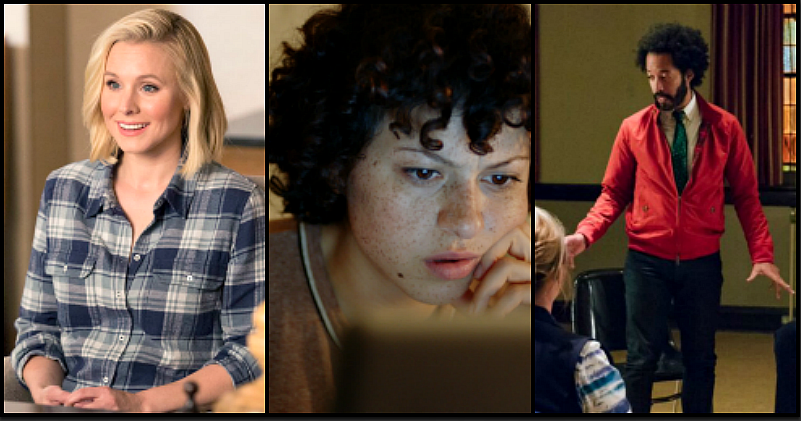There’s a new genre of TV series that is becoming very popular to write: the single-cam, half-hour dramedy. For the purpose of this article, I’m not talking about multi-cam sitcoms1 like Black-ish or hourlong dramedies like Crazy Ex-Girlfriend.

Some examples of single-cam, half-hour dramedies include The Good Place, Search Party, People of Earth, Fleabag, Dear White People, One Mississippi, BoJack Horseman, and even Transparent (which is less of a comedy than the others but still often funny). These shows may not seem to have much in common on the surface, but here are some common elements they share:
- They are usually 22-30 minutes per episode (a length we’ve historically associated with comedy).
- They are usually serialized (an element we’ve historically associated with dramas, whereas comedies have usually been episodic).
- They often star stand-up comics or actors known best for their comedic work.
- They often, but not always, contain “genre” elements such as mystery, thriller, horror, or science-fiction (a hybrid we’ve historically expected in dramas, not comedies).
- They are usually very funny with lots of quotable, gif-able moments and a few characters who are purely or almost purely comedic.
- They have poignant, even heartbreaking moments with some regularity, even ending episodes or entire seasons on a downbeat (which pure comedies almost never do).
- They have an overarching, “serious” theme they explore from different angles throughout the series.
So are these comedies or are they dramas? No wonder the Emmys can’t figure it out. But despite the genre confusion, it’s no mystery why these are appealing to write:
- They have a low page count (usually in the 22-30 range).
- Writers can flex their comedy, drama, and often even their genre muscles.
- Some of the best, most celebrated shows on television fall into this category.
- If the pilot doesn’t sell, it can usually be split at the act breaks into web-series-sized episodes.
I love watching single-cam, half-hour dramedies (or what The New Yorker aptly referred to as “heartbreak comedy“) but I rarely enjoy the unproduced scripts I read in this genre and I finally realized why: they’re not about anything.
“What makes single-cam, half-hour dramedies special? They're ABOUT something.” #amwriting Click To TweetIt’s not even enough to just be about something – these types of shows, when they’re successful, are about something deeply important, emotional, and meaningful. The Good Place is about what it really means to be a “good” or “bad” person. Search Party is about what lengths a human is entitled to go to to find meaning in her own life. People of Earth is about what it really means to be “normal.”
When I say these shows are “about” these things, what I mean is that the theme is inherent in the very premise (People of Earth is about a group of people who claim to be survivors of alien abductions, Search Party is about a directionless young woman who becomes obsessed with solving the disappearance of a former acquaintance, and The Good Place is about a self-identified jerk who dies and is accidentally sent to heaven through what appears to be some sort of clerical error) and it’s a complex enough issue that it can be explored from different angles over the course of several seasons and through the lens of characters with different worldviews.
All of these series explore a profound, complex, and nearly universal question in brief, serialized episodes using comedic, dramatic, and sometimes genre elements. The pilots I read that I don’t like are usually just about a bunch of people hanging out and doing stuff under the umbrella of a comedic premise with occasional downbeats.
So how do you pick a “profound, complex, and nearly universal question” to make your pilot about? I have an idea for that actually: How to Write What You Know When You Don’t Know Anything.
Already have your profound theme but aren’t sure how to structure the pilot? Structurally, I’ve deconstructed a group of good single-cam, half-hour dramedy pilots into acts and story beats – check out the common features between them here (it turns out they’re mostly structured in exactly the same way).
***
You can now like this page on Facebook! Click the “Following” dropdown and select “See First” and “Notifications On” to get notified of new posts.
Footnotes
- I’m not sure this theory holds up for multi-cam “hangout” comedies like Friends or How I Met Your Mother, but I think you could make this argument about a lot of multi-cam sitcoms today (Mom, Black-ish, Modern Family, One Day at a Time, Fresh Off the Boat, and The Carmichael Show all immediately come to mind). In the 90s, sitcoms like this would occasionally have “Very Special Episodes” to deal with serious issues, but on many sitcoms today every episode is about a serious issue, it’s just explored in a very funny way.